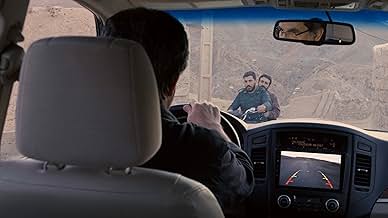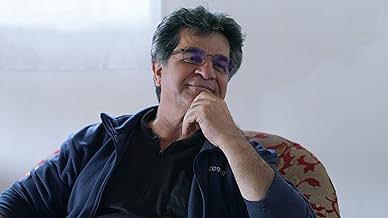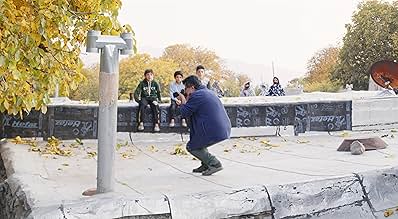IMDb-BEWERTUNG
7,2/10
4619
IHRE BEWERTUNG
Folgen Sie Anders Hofman, dem ersten Menschen, der einen Iron-Man-Triathlon in der Antarktis absolviert hat.Folgen Sie Anders Hofman, dem ersten Menschen, der einen Iron-Man-Triathlon in der Antarktis absolviert hat.Folgen Sie Anders Hofman, dem ersten Menschen, der einen Iron-Man-Triathlon in der Antarktis absolviert hat.
- Auszeichnungen
- 4 Gewinne & 8 Nominierungen insgesamt
Bakhtiyar Panjeei
- Bakhtiar
- (as Bakhtiar Panjei)
Narges Delaram
- Ghanbar's mother
- (as Narjes Delaram)
Reza Heidari
- Reza
- (as Reza Heydari)
Aliye Tuzun
- Police
- (as Aliye Tüzün)
Empfohlene Bewertungen
Director Jafar Panahi is midway in his imprisonment/house arrest in Iran, a victim of a relentless Islamic theocracy. That little matter hasn't kept him from making five films, sometimes using technology to direct remotely, for instance, his current "No Bears," in which he depicts himself directing a film within the film. Directing a Turkish town from a place near the Iranian border lends a romance to an otherwise mortally-dangerous enterprise.
His films show how he fights the restrictions of the regime on his art. All five in some way or another may reveal his oppression and lack of artistic autonomy. Panahi's films reflect his late mentor, Abbas Kiarostami, and his challenging tension between "narrative" and "documentary," when a camera seems to play between fiction and reality.
Because he hasn't been allowed to leave Iran for 10 years, his movies have a cachet usually relegated to an artistic outlaw: "This Is Not a Film," "Closed Curtain," "Taxi" and "3 Faces" are almost classics. New Yorker magazine says "No Bears" is one of the best dramas of the year, and they're right.
In No Bears, after a wild opening in which an exiled Iranian couple argue in the street about a corrupt passport and escape into Europe, we realize it's a scene from the movie he is remotely directing. Then we are thrown into a Romeo and Juliet mash up that leaves Panahi's director at the mercy of local forces, both official and citizenry, who lay tradition and family rumbling at his feet for a photo disc he allegedly has that would resolve a fight over an arranged marriage.
Panahi's director claims he has no such compromising photo of the couple, but he shows little respect for the local traditions inherent in the love affair. Underneath, of course, is his comment on cinema as a means of discerning truth in a culture of fake news. The scene of Panahi feverishly looking for cellphone reception smartly underscores the struggle to find truth.
At the least, No Bears is a profound statement about the power of filmmaking as it clashes with custom and reality. It is a masterful meta-fiction that tells a complicated cultural tale and the fraught participation of cinema. 80 for Brady it is not.
His films show how he fights the restrictions of the regime on his art. All five in some way or another may reveal his oppression and lack of artistic autonomy. Panahi's films reflect his late mentor, Abbas Kiarostami, and his challenging tension between "narrative" and "documentary," when a camera seems to play between fiction and reality.
Because he hasn't been allowed to leave Iran for 10 years, his movies have a cachet usually relegated to an artistic outlaw: "This Is Not a Film," "Closed Curtain," "Taxi" and "3 Faces" are almost classics. New Yorker magazine says "No Bears" is one of the best dramas of the year, and they're right.
In No Bears, after a wild opening in which an exiled Iranian couple argue in the street about a corrupt passport and escape into Europe, we realize it's a scene from the movie he is remotely directing. Then we are thrown into a Romeo and Juliet mash up that leaves Panahi's director at the mercy of local forces, both official and citizenry, who lay tradition and family rumbling at his feet for a photo disc he allegedly has that would resolve a fight over an arranged marriage.
Panahi's director claims he has no such compromising photo of the couple, but he shows little respect for the local traditions inherent in the love affair. Underneath, of course, is his comment on cinema as a means of discerning truth in a culture of fake news. The scene of Panahi feverishly looking for cellphone reception smartly underscores the struggle to find truth.
At the least, No Bears is a profound statement about the power of filmmaking as it clashes with custom and reality. It is a masterful meta-fiction that tells a complicated cultural tale and the fraught participation of cinema. 80 for Brady it is not.
A masterfully crafted film that showcases the incredible talent of Iranian director Jafar Panahi. Despite facing constant harassment and a six-year prison sentence on baseless charges, Panahi continues to push the boundaries of cinema with his deeply personal and thought-provoking work.
In "No Bears," Panahi plays a fictionalized version of himself as he directs a film remotely from the Iranian village of Joban, near Turkey. When his WiFi goes out, he becomes intrigued by a local ceremony and loans one of his cameras to a villager to document it. The film then follows two parallel tracks: the story of Bakhtiar and Zara, which serves as a reconstruction of a real-life event, and the recording of the ceremony, which opens up a can of worms in the village as it is used as evidence against a young woman accused of having premarital relations.
Throughout the film, Panahi deftly explores themes of truth-telling, social activism, and the blurred lines between reality and fiction. The acting is superb, with Bakhtiar and Zara's tumultuous relationship feeling both realistic and emotionally charged. The cinematography and direction are also top-notch, with the film's remote setting adding to its sense of isolation and tension.
Overall, "No Bears" is a powerful and thought-provoking film that showcases the resilience and determination of its director. It is a must-see for fans of Panahi's work and anyone interested in the intersection of art and politics.
In "No Bears," Panahi plays a fictionalized version of himself as he directs a film remotely from the Iranian village of Joban, near Turkey. When his WiFi goes out, he becomes intrigued by a local ceremony and loans one of his cameras to a villager to document it. The film then follows two parallel tracks: the story of Bakhtiar and Zara, which serves as a reconstruction of a real-life event, and the recording of the ceremony, which opens up a can of worms in the village as it is used as evidence against a young woman accused of having premarital relations.
Throughout the film, Panahi deftly explores themes of truth-telling, social activism, and the blurred lines between reality and fiction. The acting is superb, with Bakhtiar and Zara's tumultuous relationship feeling both realistic and emotionally charged. The cinematography and direction are also top-notch, with the film's remote setting adding to its sense of isolation and tension.
Overall, "No Bears" is a powerful and thought-provoking film that showcases the resilience and determination of its director. It is a must-see for fans of Panahi's work and anyone interested in the intersection of art and politics.
The film "No Bears" starts off simple but becomes more complex as it progresses. Even if you're not familiar with the work of Kiarostami and Makhmalbaf, you can still enjoy it. The director, Panahi, mixes documentary-style and autobiographical elements to create a powerful emotional impact. Panahi, who is at the center of the film, is forced to confront the consequences of his work, both for himself and his collaborators. The final image of the film is sobering and resonates with the unspoken anguish of an artist exiled in his own country, who has had enough. It is clear that the director has little left to lose, and this makes "No Bears" one of the best movies of the previous year.
The way Jafar Panahi successfully transcends and exceeds all the limits in his filmmaking always leaves me mind-boggled and is fascinatingly masterful. This viewing experience left me with a question "To what extent are you willing to go to tell your story?"
No Bears takes us through a powerful journey of sophisticated simplicity that expands boundaries and defies censorship restrictions both mentally and physically and in a blend of fiction and realism with a story of adaptive determination in creating, fear of crucial decisions, and passion for the story.
His ability to shape the narrative with all these elements is beyond impressive as Panahi sheds his lens on a parallel story between reality and fiction under the premise of hope, while metaphorically introducing a bigger political theme of the fear of modern authority versus the absurdity of the superstition that remains a common element in both narratives including the self-reflexively portrayal of himself as a character, which also introduces an intimate layer.
The storytelling crafts beautifully palpable emotions some of which are felt indirectly, where the sense of fear and threat are always visible and kept translating different feelings so well through an observative lens.
No Bears takes us through a powerful journey of sophisticated simplicity that expands boundaries and defies censorship restrictions both mentally and physically and in a blend of fiction and realism with a story of adaptive determination in creating, fear of crucial decisions, and passion for the story.
His ability to shape the narrative with all these elements is beyond impressive as Panahi sheds his lens on a parallel story between reality and fiction under the premise of hope, while metaphorically introducing a bigger political theme of the fear of modern authority versus the absurdity of the superstition that remains a common element in both narratives including the self-reflexively portrayal of himself as a character, which also introduces an intimate layer.
The storytelling crafts beautifully palpable emotions some of which are felt indirectly, where the sense of fear and threat are always visible and kept translating different feelings so well through an observative lens.
The movie "No Bears" has a sensitive and dramatic plot against the backdrop of political, religious, tradition, and cultural repression in the current Iranian world. There are two love stories told in parallel by the excellent director Jafar Panahi, who himself suffers military repression for his political movies that challenge the dictatorial Iranian government. Jafar Panahi manages to capture and transmit all the tension that Iranians suffer under the eyes of the so-called Cultural Police. We sense the pressure in the air and nobody wants to compromise or get involved or close to citizens considered traitors to the country and to the traditional customs.
Like many other incredible Iranian movies, "No Bears" is second to none in terms of quality. Simple in showing the daily life of a village and the background of filming a movie, but also bold in showing us what it's like to live in a repressive regime and not bend.
Like many other incredible Iranian movies, "No Bears" is second to none in terms of quality. Simple in showing the daily life of a village and the background of filming a movie, but also bold in showing us what it's like to live in a repressive regime and not bend.
Wusstest du schon
- WissenswertesActually, the entire scene shot in Istanbul Kadikoy, not in Turkish border town.
Top-Auswahl
Melde dich zum Bewerten an und greife auf die Watchlist für personalisierte Empfehlungen zu.
- How long is No Bears?Powered by Alexa
Details
Box Office
- Bruttoertrag in den USA und Kanada
- 167.333 $
- Eröffnungswochenende in den USA und in Kanada
- 6.173 $
- 25. Dez. 2022
- Weltweiter Bruttoertrag
- 1.196.288 $
- Laufzeit1 Stunde 46 Minuten
- Farbe
- Seitenverhältnis
- 1.85 : 1
Zu dieser Seite beitragen
Bearbeitung vorschlagen oder fehlenden Inhalt hinzufügen
























